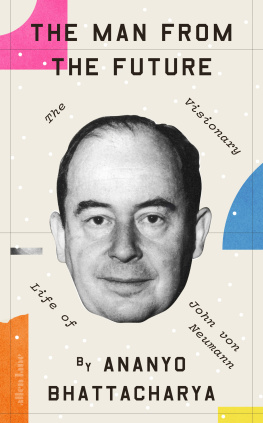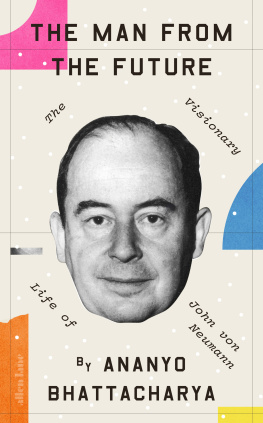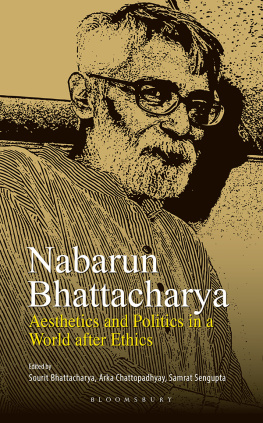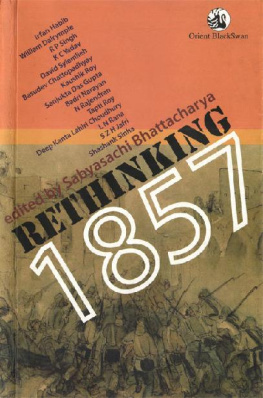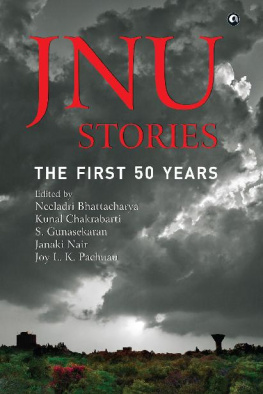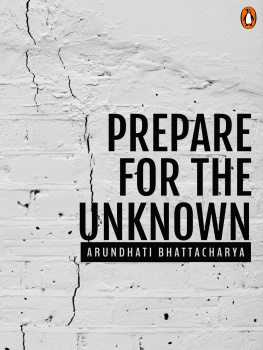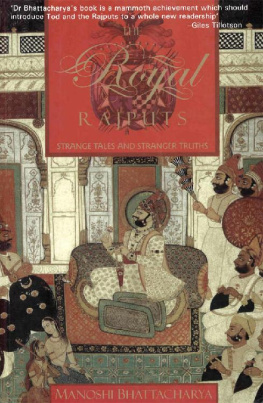Ananyo Bhattacharya - The Man from the Future: The Visionary Life of John von Neumann
Here you can read online Ananyo Bhattacharya - The Man from the Future: The Visionary Life of John von Neumann full text of the book (entire story) in english for free. Download pdf and epub, get meaning, cover and reviews about this ebook. year: 2021, publisher: Penguin Books Ltd, genre: Non-fiction. Description of the work, (preface) as well as reviews are available. Best literature library LitArk.com created for fans of good reading and offers a wide selection of genres:
Romance novel
Science fiction
Adventure
Detective
Science
History
Home and family
Prose
Art
Politics
Computer
Non-fiction
Religion
Business
Children
Humor
Choose a favorite category and find really read worthwhile books. Enjoy immersion in the world of imagination, feel the emotions of the characters or learn something new for yourself, make an fascinating discovery.
- Book:The Man from the Future: The Visionary Life of John von Neumann
- Author:
- Publisher:Penguin Books Ltd
- Genre:
- Year:2021
- Rating:5 / 5
- Favourites:Add to favourites
- Your mark:
- 100
- 1
- 2
- 3
- 4
- 5
The Man from the Future: The Visionary Life of John von Neumann: summary, description and annotation
We offer to read an annotation, description, summary or preface (depends on what the author of the book "The Man from the Future: The Visionary Life of John von Neumann" wrote himself). If you haven't found the necessary information about the book — write in the comments, we will try to find it.
The Man from the Future: The Visionary Life of John von Neumann — read online for free the complete book (whole text) full work
Below is the text of the book, divided by pages. System saving the place of the last page read, allows you to conveniently read the book "The Man from the Future: The Visionary Life of John von Neumann" online for free, without having to search again every time where you left off. Put a bookmark, and you can go to the page where you finished reading at any time.
Font size:
Interval:
Bookmark:

PENGUIN BOOKS
UK | USA | Canada | Ireland | Australia
New Zealand | India | South Africa
Penguin Books is part of the Penguin Random House group of companies whose addresses can be found at global.penguinrandomhouse.com.

First published in Great Britain by Allen Lane 2021
Copyright Ananyo Bhattacharya, 2021
The moral right of the author has been asserted
Cover design: Matthew Young
Cover photograph Pictorial Press Ltd/Alamy Stock Photo
Every effort has been made to trace the copyright-holders of the material in this book. The publisher regrets any oversight and upon notification will rectify any omission in future reprints or editions.
ISBN: 978-0-241-39887-6
This ebook is copyright material and must not be copied, reproduced, transferred, distributed, leased, licensed or publicly performed or used in any way except as specifically permitted in writing by the publishers, as allowed under the terms and conditions under which it was purchased or as strictly permitted by applicable copyright law. Any unauthorized distribution or use of this text may be a direct infringement of the authors and publishers rights and those responsible may be liable in law accordingly.
To geeks and nerds everywhere,
but especially for the three closest to me.
If people do not believe that mathematics is simple, it is only because they do not realize how complicated life is.
John von Neumann
Von Neumann would carry on a conversation with my three-year-old son, and the two of them would talk as equals, and I sometimes wondered if he used the same principle when he talked to the rest of us.
Edward Teller, 1966
Call me Johnny, he urged the Americans invited to the wild parties he threw at his grand house in Princeton. Though he never shed a Hungarian accent that made him sound like horror-film legend Bela Lugosi, von Neumann felt that Jnos his real name sounded altogether too foreign in his new home. Beneath the bonhomie and the sharp suit was a mind of unimaginable brilliance.
At the Institute for Advanced Study in Princeton, where he was based from 1933 to his death in 1957, von Neumann enjoyed annoying distinguished neighbours such as Albert Einstein and Kurt Gdel by playing German marching tunes at top volume on his office gramophone. Einstein revolutionized our understanding of time, space and gravity. Gdel, while no celebrity, was equally revolutionary in the field of formal logic. But those who knew all three concluded that von Neumann had by far the sharpest intellect. His colleagues even joked that von Neumann was descended from a superior species but had made a detailed study of human beings so he could imitate them perfectly.
As a child, von Neumann absorbed Ancient Greek and Latin, and spoke French, German and English as well as his native Hungarian. He devoured a forty-five-volume history of the world and was able to recite whole chapters verbatim decades later. A professor of Byzantine history who was invited to one of von Neumanns parties said he would come only if it was agreed they would not discuss the subject. Everybody thinks I am the worlds greatest expert in it, he told von Neumanns wife, and I want them to keep on thinking that.
The principal focus of von Neumanns incredible brain, however, was neither linguistics nor history but mathematics. Mathematicians often describe what they do as a sort of noble game, the object of which is to prove theorems, divorced from any real application. That is often true. But maths is also the language of the sciences the most powerful tool we have for understanding the universe. How can it be that mathematics, asked Einstein, being after all a product of human thought which is independent of experience, is so admirably appropriate to the objects of reality? No one has come up with a definitive answer to that question. Since antiquity, however, mathematicians with a talent for its application have, like von Neumann, understood that they have a path to wealth, influence and the power to transform the world. Archimedes spent time on otherworldly pursuits such as finding a new way to approximate the number pi. But the war machines he designed to exacting mathematical principles, such as a giant claw that could pluck ships from the sea, frustrated for a time the Roman army.
The mathematical contributions von Neumann made in the mid-twentieth century now appear more eerily prescient with every passing year. To fully understand the intellectual currents running through our century from politics to economics, technology to psychology one has to understand von Neumanns life and work in the last. His thinking is so pertinent to the challenges we face today that it is tempting to wonder if he was a time traveller, quietly seeding ideas that he knew would be needed to shape the Earths future.
Born in 1903, von Neumann was just twenty-two years old when he helped to lay the mathematical foundations of quantum mechanics. He moved to America in 1930 and, realizing early on that war was looming, studied the mathematics of ballistics and explosions. He lent his expertise to the American armed forces and the Manhattan Project: among the scientists at Los Alamos who developed the atomic bomb, it was von Neumann who determined the arrangement of explosives that would be required to detonate the more powerful Fat Man device by compressing its plutonium core.
The same year he joined the Manhattan Project, von Neumann was finishing, with the economist Oskar Morgenstern, a 640-page treatise on game theory a field of mathematics devoted to understanding conflict and cooperation. That book would change economics, make game theory integral to fields as disparate as political science, psychology and evolutionary biology and help military strategists to think about when leaders should and should not push the nuclear button. With his unearthly intelligence and his unflinching attitude to matters of life and death, von Neumann was one of a handful of scientists who inspired the iconic Stanley Kubrick character Dr Strangelove.
After the atom bombs he helped to design were dropped on Hiroshima and Nagasaki, von Neumann turned his efforts to building possibly the worlds first programmable electronic digital computer, the ENIAC. Initially his aim was to calculate whether or not it would be possible to build a more powerful bomb the hydrogen bomb. He then led the team that produced the first computerized weather forecast. Not content with computers that merely calculated, von Neumann showed during a lecture in 1948 that information-processing machines could, under certain circumstances, reproduce, grow and evolve. His automata theory inspired generations of scientists to try and build self-replicating machines. Later, his musings on the parallels between the workings of brains and computers helped to trigger the birth of artificial intelligence and influenced the development of neuroscience.
Von Neumann was a pure mathematician of extraordinary ability. He established, for example, a new branch of mathematics, now named after him, that was richly productive: half a century later, Vaughan Jones won the Fields Medal often called the Nobel Prize of maths for his work exploring one tiny aspect of it. But mere intellectual puzzles, no matter how profound, were not enough for him. Von Neumann constantly sought new practical fields to which he could apply his mathematical genius, and he seemed to choose each one with an unerring sense of its potential to revolutionize human affairs. As he moved from pure mathematics to physics to economics to engineering, he became steadily less deep and steadily more important, observed von Neumanns former colleague, mathematical physicist Freeman Dyson.
Font size:
Interval:
Bookmark:
Similar books «The Man from the Future: The Visionary Life of John von Neumann»
Look at similar books to The Man from the Future: The Visionary Life of John von Neumann. We have selected literature similar in name and meaning in the hope of providing readers with more options to find new, interesting, not yet read works.
Discussion, reviews of the book The Man from the Future: The Visionary Life of John von Neumann and just readers' own opinions. Leave your comments, write what you think about the work, its meaning or the main characters. Specify what exactly you liked and what you didn't like, and why you think so.

